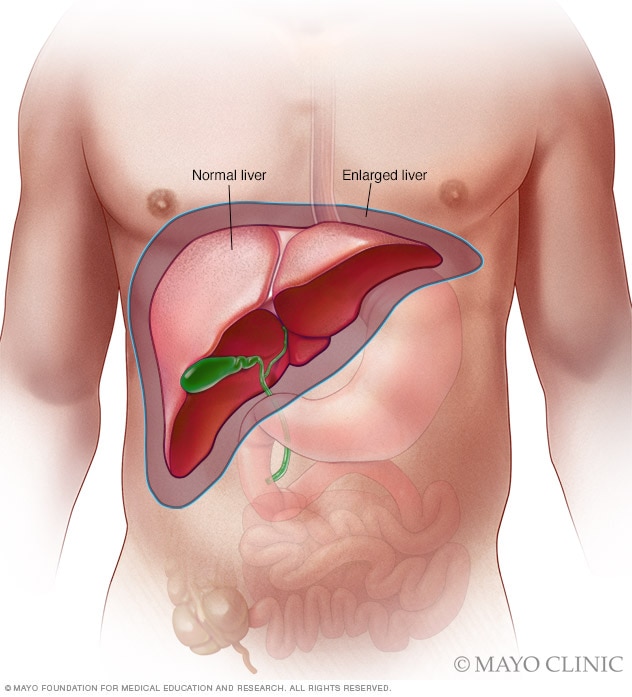Overview
Having an enlarged liver is usually a sign of an underlying condition, such as liver disease, congestive heart failure or cancer. The medical term for enlarged liver is hepatomegaly (hep-uh-toe-MEG-uh-le).
Management involves finding the condition causing the enlarged liver and treating it.

Enlarged liver
An enlarged liver can have many possible causes.
Symptoms
An enlarged liver might not cause symptoms.
In some instances, when enlarged liver results from liver disease, it also might cause:
- Belly pain.
- Fatigue.
- Nausea and vomiting.
- Yellowing of the skin and the whites of the eyes, called jaundice.
When to see a doctor
Make an appointment with a healthcare professional if you have symptoms that worry you.
From Mayo Clinic to your inbox
Causes
The liver is a large, football-shaped organ found in the upper right portion of the abdomen. The size of the liver varies with age, sex and body size. Many conditions can cause it to enlarge, including:
Liver diseases
- Cirrhosis.
- Hepatitis caused by a virus — including hepatitis A, B and C — or caused by infectious mononucleosis.
- Nonalcoholic fatty liver disease (NAFLD), now known as metabolic dysfunction-associated steatotic liver disease (MASLD).
- Alcoholic fatty liver disease.
- A disease caused by a buildup of a certain protein in the liver, called amyloidosis.
- A genetic condition that causes copper to accumulate in the liver, called Wilson's disease.
- A disease that causes iron to build up in the liver, known as hemochromatosis.
- A condition that causes fatty substances to accumulate in the liver, called Gaucher disease.
- Fluid-filled pockets in the liver, known as liver cysts.
- Noncancerous liver tumors, including hemangioma and adenoma.
- Blockage of the gallbladder or bile ducts.
- Toxic hepatitis.
Cancers
- Cancer that begins in another part of the body and spreads to the liver.
- Leukemia.
- Liver cancer.
- Lymphoma.
Heart and blood vessel problems
- Blockage of the veins that drain the liver, known as Budd-Chiari syndrome.
- Heart failure.
- Inflammation of the tissue surrounding the heart, called pericarditis.
Risk factors
You're more likely to develop an enlarged liver if you have a liver disease. Factors that can increase your risk of liver conditions include:
- Excessive alcohol use. Drinking large amounts of alcohol can damage your liver.
- Large doses of medicines, vitamins or supplements. Taking larger than recommended doses of vitamins, supplements, nonprescription or prescription medicines can increase your risk of liver damage.
Acetaminophen overdose is the most common cause of acute liver failure in the United States. Besides being the ingredient in nonprescription pain relievers such as Tylenol, it's in more than 600 medicines, both nonprescription and prescription.
Know what's in the medicines you take. Read labels. Look for "acetaminophen," "acetam" or "APAP." Check with a healthcare professional if you're not sure what's too much.
- Herbal supplements. Certain supplements, including black cohosh, ma-huang and valerian, can increase your risk of liver damage.
- Infections. Infectious diseases, viral, bacterial or parasitic, can increase your risk of liver damage.
- Hepatitis viruses. Hepatitis A, B and C can cause liver damage.
- Poor eating habits. Being overweight increases your risk of liver disease. So does eating unhealthy foods, such as those with too much fat or sugar.
Prevention
To reduce your risk of liver disease, you can:
- Eat a healthy diet. Choose a diet full of fruits, vegetables and whole grains.
- Drink alcohol in moderation, if at all. Check with your healthcare team to find out what's the right amount of alcohol for you, if any.
- Follow directions when taking medicines, vitamins or supplements. Limit yourself to the recommended doses.
- Limit contact with chemicals. Use aerosol cleaners, insecticides and other toxic chemicals only in well-ventilated areas. Wear gloves, long sleeves and a mask.
- Maintain a healthy weight. Eat a balanced diet and limit foods that are high in sugar and fat. If you're overweight, ask your care team about the best way for you to lose weight.
- Quit smoking. Ask your care team about strategies to help you quit.
- Use supplements with caution. Talk with your healthcare team about the risks and benefits of herbal supplements before you take them. Some alternative medicine treatments can harm your liver.
Herbs and supplements to avoid include black cohosh, ma-huang and other Chinese herbs, comfrey, germander, greater celandine, kava, pennyroyal, skullcap, and valerian.